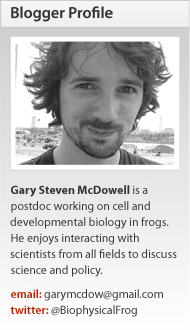-
October 21, 2015
Advocating for changes to science at Future of ... -
September 19, 2015
Chicago Postdocs To Discuss Training, Science P... -
September 13, 2015
Listening to our universe with gravitational wa... -
June 09, 2015
Science Visualization at the VIVID Festival -
April 20, 2015
Postdoc Advocates Step Into the Spotlight at Na... -
March 19, 2015
Conferences to engage and build communities -
February 27, 2015
The Organization and Execution of a Postdoc-Run... -
January 19, 2015
Scientific Meetings and Advocacy: same place, d... -
December 27, 2014
The Future of Research Symposium -
November 10, 2014
Join the Twitter Chorus -
July 03, 2014
More than Just Meetings - Xenopus, Advanced Ima... -
June 26, 2014
Singer for your Supper - BYG2014 Singer Session -
June 26, 2014
A yeast-y world view - British Yeast Group 2014... -
May 31, 2014
A New View on Life - BioVisions (#BVA2014) -
April 26, 2014
55th Annual Drosophila Research Conference (#Dr... -
April 04, 2014
SynBio Future - Synthetic biology for the masses! -
March 17, 2014
Science. Polish Perspectives (#SPP2013) -
February 17, 2014
2013 ASCB Annual Meeting - #ASCB2013 -
December 02, 2013
Science Online: Oceans - #SciOOceans -
November 25, 2013
Molecular Biology & Pathogenesis of the Clostri... -
September 20, 2013
Science Online Climate - #SciOClimate -
August 17, 2013
Let's go round again - One year of Conference C... -
August 07, 2013
Communicating Science 2013 (ComSciCon13) -
July 25, 2013
International Society for Stem Cell Research 20... -
July 11, 2013
#pombe2013 - 6 days in 6 ways: Saturday/Mindmaps -
July 10, 2013
#pombe2013 - 6 days in 6 ways: Friday/Twitter -
July 09, 2013
#pombe2013 - 6 days in 6 ways: Thursday/Blogging -
July 08, 2013
#pombe2013 - 6 days in 6 ways: Wednesday/Headlines -
July 05, 2013
#pombe2013 - 6 days in 6 ways: Tuesday/Scribing -
July 04, 2013
#pombe2013 - 6 days in 6 ways: Monday/Instagram -
June 08, 2013
Getting Together: Science Speed Dating -
May 31, 2013
Scientific Vision: Imagery in Science & Confere... -
May 24, 2013
BSA Science Communication 2013 (#SciComm2013) -
May 19, 2013
Science mojo: Gradually diminished, instantly r... -
May 01, 2013
Flying High - 54th Annual Drosophila Research C... -
April 01, 2013
Spring Conferences 2013 - April -
February 19, 2013
SpotOn NYC (SONYC) - Doodling Science -
January 01, 2013
Falling Walls Lab Berlin 2012 - Competition -
December 30, 2012
Falling Walls Lab Berlin 2012 - Preliminaries -
December 29, 2012
Falling Walls Lab Berlin 2012 - 3 minutes, 1 day -
December 17, 2012
Science. Polish Perspectives (SPP2012) -
December 08, 2012
21th International Colloquium on Magnetic Films... -
December 03, 2012
SpotOn London 2012 (#solo12): Starting a Conver... -
November 25, 2012
SpotOn London 2012 (#solo12): Connecting the Dots -
November 24, 2012
SpotOn London 2012 (#solo12): How Fringe Sessio... -
November 18, 2012
14th Xenopus International Conference - Days 4 & 5 -
November 15, 2012
14th Xenopus International Conference - Days 1 ... -
October 10, 2012
European Conference on Computational Biology (E... -
October 08, 2012
European Conference on Computational Biology (E... -
September 28, 2012
The International Conference on Science Communi... -
September 21, 2012
4th International Congress on Stem Cells and Ti... -
September 17, 2012
ESA2012 - Through the magic of Twitter-vision -
September 17, 2012
Ecological Society of America (ESA) 2012 - In R... -
September 10, 2012
European Conference on Computational Biology (E... -
September 07, 2012
FASEB - Protein Folding in the Cell -
August 17, 2012
Hermes 2012 - A Scientific Surprise -
August 14, 2012
UKCSJ - UK Conference of Science Journalists -
August 12, 2012
IWPCTM13 - International Workshop on the Physic... -
August 10, 2012
Looking Ahead - Conferences in Aug/Sept 2012 -
August 09, 2012
Conference Cast Reloaded -
September 14, 2011
EMBO conference - day four -
September 13, 2011
EMBO conference - day three -
September 12, 2011
EMBO conference - day two -
September 11, 2011
EMBO conference - day one -
July 17, 2011
SFAM conference - day four -
July 16, 2011
SFAM conference - day three -
July 14, 2011
SFAM conference - day two -
July 14, 2011
SFAM conference - day one -
June 21, 2011
Structural Systems Biology Conference - Part II -
June 20, 2011
Structural Systems Biology Conference - Part I -
May 07, 2011
BSCB-BSDB Spring Conference - Day 4 -
May 05, 2011
BSCB-BSDB Spring Conference - Day 3 -
May 03, 2011
BSCB-BSDB Spring Conference - Day 2 -
May 02, 2011
BSCB-BSDB Spring Conference - Day 1 -
April 19, 2011
Society for General Microbiology Conference - S... -
April 11, 2011
SciBarCamb2011 -
March 18, 2011
OMNG - Day 3 -
March 16, 2011
OMNG - Day 2 -
March 15, 2011
OMGN - Day 1 -
February 12, 2011
SciOnline - Student Reflections III
« Prev « Prev Next » Next »























